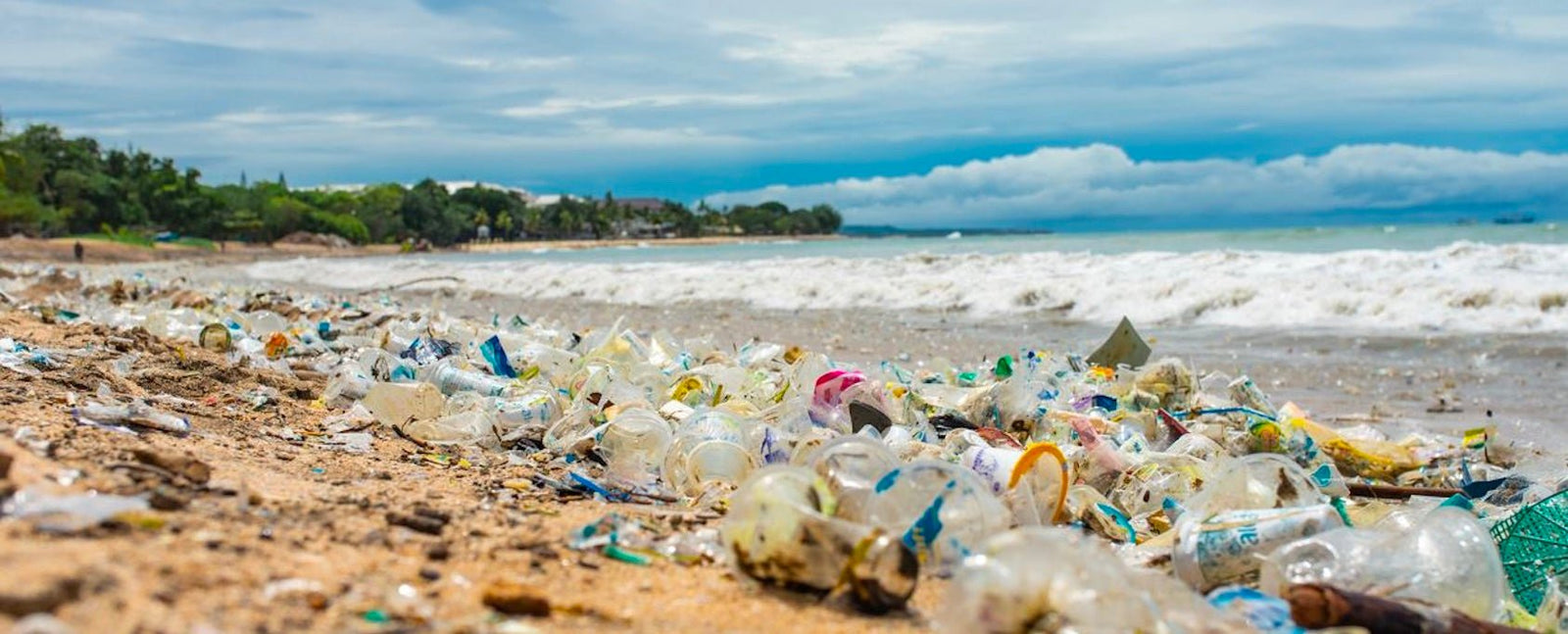
The Rise of Plastic Bottle Pollution in Island Communities
by Duncan Peters October 08, 2023 6 min read
Introduction
The global crisis of clean drinking water
Access to clean and safe drinking water is a fundamental human right, yet it remains a pressing global challenge. The World Health Organization (WHO) estimates that approximately 2.2 billion people worldwide lack access to safely managed drinking water services, leading to severe health, social, and economic consequences. While this crisis affects diverse regions, island communities, often isolated and with limited natural water sources, face unique and exacerbated challenges in ensuring their inhabitants have access to clean water.
The unexpected consequence: plastic bottle pollution
In the quest for potable water, many island communities turn to the convenience of bottled water. Paradoxically, this solution, intended to quench their thirst, has given rise to an unintended environmental crisis: plastic bottle pollution. As the demand for clean drinking water grows, so does the production and disposal of single-use plastic bottles. This issue presents a stark reminder of the complex relationship between human necessity and environmental sustainability.
The focus on island communities
Island communities, scattered across the world's oceans, are particularly susceptible to the detrimental effects of plastic bottle pollution. Limited access to clean drinking water sources, often coupled with underdeveloped infrastructure, drives residents and tourists alike to rely on bottled water, compounding the problem. This article delves into the alarming rise of plastic bottle pollution in island communities and explores the factors contributing to this crisis, while also shedding light on innovative solutions and the critical lessons they offer for a more sustainable future.
The Alarming Rise of Plastic Bottle Pollution
Island communities around the world are grappling with an unprecedented surge in plastic bottle pollution, which threatens their fragile ecosystems and the well-being of their residents. This section delves into the factors contributing to the proliferation of plastic bottles and the dire consequences it entails.
The Ubiquity of Plastic Bottles on Islands
The prevalence of plastic bottles on islands is evident due to several interconnected factors. Island life often revolves around tourism, which significantly amplifies the demand for bottled water. Tourists, concerned about the safety of tap water, frequently rely on bottled water as a convenient and trusted source of hydration. Consequently, this reliance on bottled water is exacerbated by the scarcity of natural water sources on many islands, rendering locals and visitors alike dependent on plastic bottles.
Moreover, the convenience of single-use plastic bottles is hard to ignore, making them the preferred choice for on-the-go hydration. This convenience has permeated island communities, leading to an explosion of plastic bottle consumption.
Challenges in Managing Plastic Waste
The proliferation of plastic bottles comes with a host of challenges in terms of waste management. Island communities often lack the infrastructure and resources needed to effectively handle the vast quantities of plastic bottles generated daily. Proper disposal and recycling facilities are frequently underdeveloped or non-existent, leaving plastic bottles to accumulate in landfills or, even worse, to escape into the surrounding environment.
The Environmental and Health Impacts
The environmental repercussions of this plastic bottle pollution are profound. Plastic bottles that find their way into the surrounding ecosystems, particularly oceans, contribute to marine pollution. These bottles break down into microplastics, which are ingested by marine life, causing harm to the food chain and disrupting the balance of aquatic ecosystems.
Additionally, the degradation of plastic bottles in the environment releases harmful chemicals, further endangering marine and terrestrial ecosystems. Over time, these bottles can compromise the aesthetic appeal of the islands, jeopardising the tourism industry, which is often the backbone of their economy.
The plastic bottle pollution also poses health risks to island residents. Contaminated water sources, exacerbated by the use of bottled water, can lead to waterborne diseases and public health concerns, especially in regions with limited healthcare access.
The alarming rise of plastic bottle pollution on islands underscores the urgent need for innovative and sustainable solutions to mitigate its impact on the environment and the well-being of these communities.
Factors Contributing to Plastic Bottle Pollution
Island communities are facing a mounting crisis of plastic bottle pollution, driven by several interconnected factors:
Tourism and its Impact
Tourism is a double-edged sword for many island destinations. While it brings economic opportunities, it also significantly contributes to the proliferation of plastic bottle pollution. Tourists often rely on single-use plastic bottles as a convenient and familiar source of drinking water. The tourism industry's demand for bottled water exacerbates the issue, as many establishments provide it as a primary beverage option. Tourist hotspots can witness a surge in plastic waste, overwhelming local waste management systems.
Consumer Behaviour and Convenience
Consumer habits play a pivotal role in the plastic bottle pollution problem. The convenience of single-use plastic bottles makes them an attractive choice for both locals and tourists. In many cases, it's easier to grab a disposable bottle than seek out alternatives. The lack of awareness or alternative options further perpetuates the use of plastic bottles, adding to the environmental burden.
Inadequate Recycling Facilities
Islands, often constrained by geographical and logistical limitations, face challenges in establishing efficient recycling facilities. The infrastructure required for collecting, sorting, and recycling plastic bottles is costly and often lacking in these communities. This deficiency results in a significant portion of plastic bottles ending up in landfills or, worse, as litter in the environment.
Addressing the plastic bottle pollution crisis in island communities requires a holistic approach that tackles these contributing factors. By understanding the complex web of tourism, consumer behaviour, and recycling challenges, communities can develop strategies to mitigate the problem and promote a more sustainable future.
Case Studies from Island Communities
The Maldives
The Maldives, an iconic island nation, faces the challenges of both water scarcity and plastic bottle pollution. With limited freshwater sources and a growing tourist industry, the demand for clean drinking water is high. To address this, the Maldives has been implementing water purification and desalination technologies to reduce its reliance on bottled water. These sustainable solutions have not only eased the strain on natural resources but also decreased plastic bottle waste on the islands. The Maldives serves as an inspiring example of how innovative technologies can help mitigate the plastic bottle pollution crisis in island communities.
Bali, Indonesia
Bali, Indonesia, has long been a popular tourist destination, attracting millions of visitors each year. The influx of tourists has led to a surge in the consumption of bottled water, exacerbating the issue of plastic bottle pollution. In response, various local initiatives, NGOs, and businesses have come together to promote reusable water bottles, water refill stations, and community-driven campaigns. These efforts have significantly reduced the reliance on single-use plastic bottles and have led to a cleaner environment, demonstrating the potential for community-driven solutions.
Jamaica
Jamaica, another island nation, has also been grappling with the consequences of plastic bottle pollution. The government of Jamaica has introduced initiatives to encourage recycling and reduce plastic waste. In particular, they have implemented a plastic bottle deposit and return system, which incentives consumers to return their empty bottles for recycling. This approach has not only reduced the volume of plastic bottles in the environment but also generated income opportunities for local communities involved in the recycling process.
These case studies illustrate the varying strategies island communities have employed to combat plastic bottle pollution, emphasising the importance of tailored, community-focused solutions in the global effort to address this issue. They serve as inspiring models for other island nations and regions facing similar challenges.
Innovative Solutions
At IF, we are proud to introduce a groundbreaking solution that aims to address the dual challenges of plastic bottle pollution and the global need for clean drinking water, especially in island communities. Our innovative hardware rethinks point-of-use water purification, setting new standards in the industry.
Our technology is capable of consistently producing safe drinking water from remote or previously untreatable sources, all without the need for consumable parts. This breakthrough not only guarantees a reliable source of clean water for island communities but also makes a significant contribution to reducing the plastic waste plaguing these beautiful locations.
We believe our technology represents a significant step towards a cleaner, greener, and more eco-conscious future, not only for island communities but for the entire world. Together, we can make a difference.
Conclusion
The plastic bottle pollution crisis in island communities is an urgent and growing issue that demands our immediate attention. Clean drinking water is a basic human necessity, and it is disheartening to see the unintended consequences of the increased reliance on bottled water. While the situation is challenging, it is not insurmountable.
Contact us to learn more about water purification for island populations.
Get more out of IF
Join our mailing list to learn more about our innovative technology, be the first in line to experience its benefits, and join a community of people who want better water and better health.


